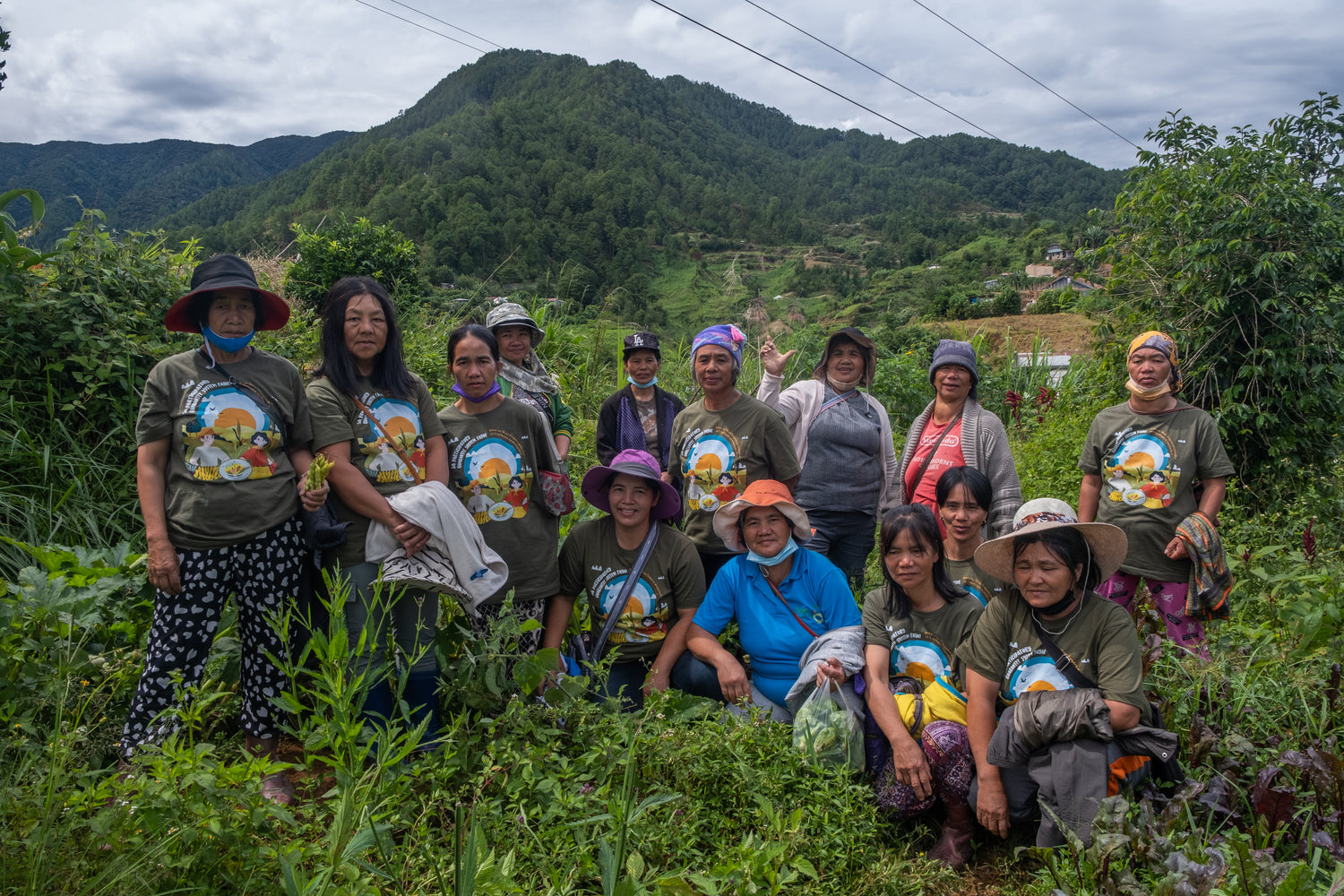Working with small-scale organic farmers

Why do you work with small-scale farmers?
We feel it is one of the gravest injustices that the very people who feed us are among the most vulnerable and experience periodic hunger. Small-scale farmers, also known as peasant farmers, are the primary food providers of the world (ETC Group, 2022), especially in agricultural countries like the Philippines. The Magna Carta defines them as those who rely on “small-scale subsistence farming as their primary source of income,” cultivating land smaller than two hectares and earning no more than P180,000 annually from it. As such they are also among the poorest among the basic sectors.
Following our Pamayanihan model, our work with small-scale farmers provides them diverse and nutritious food and a regular income to help address hunger at the household level and minimize their economic precarity.
Why organic farming?
Organic agriculture provides peasant farmers with a way to produce for themselves and their communities without requiring expensive chemical-based inputs. The use of synthetic fertilizers and pesticides has been known to trap farmers in a pesticide treadmill, a cycle that requires the continuous application of pesticides, often in increasing concentrations, just to be able to achieve previous yields.
This kind of farming is known to bury resource-poor farmers in debt and has led to the forfeiture of their lands, which they often use as collateral. Organic farming also grows food in a way that is kind to the planet: regenerating the soil, protecting our food pollinators, enhancing biodiversity, and avoiding emissions and pollutants. With our model, immediately farmers and consumers have safe food for their families.
Are the farms certified organic?
We work with farmers associations and cooperatives recognized in their respective municipalities and provinces as legitimate and accredited organizations with a commitment to advancing sustainable organic agriculture.
They follow the Philippine National Standard for Organic Agriculture as a minimum standard, and are undergoing training and accreditation in the Participatory Guarantee System (PGS), a locally focused quality assurance system for organic agriculture that is recognized under the Amended Organic Agriculture Act.
Organic certification by third parties is appropriate for farmers’ organizations and enterprises interested in expanding to international markets, which expect such a label. Organic certification is expensive for small-scale farmers and microenterprises like Good Food with our focus and interest in meeting local food needs.
PGS is designed to give resource-poor farmers a credible yet inexpensive organic certification system to ensure the integrity of the organic product “based on active participation of stakeholders.” PGS is also built on a foundation of trust, social networks, and knowledge exchange,” which is aligned with the role of Good Food to strengthen the connection between rural farmers and urban eaters, which is being severed by an increasingly industrialized food system designed for profit maximization rather than meeting people’s right to safe, nutritious, culturally appropriate food.
Our Partner Faming Communities
Chico River Organic Practioners Organization
This group of 26 CROPO farmers are all women; and moms on top of that! They are able to take on these two jobs because they farm on small plots in their backyard. This vibrant group of women climb steep mountains and trek through creeks every week to deliver our vegetables to their central station.

Capas Organic Farmers Producers Cooperative
In 2010, Sibol ng Angham at Teknolohiya helped this farmer group establish a cooperative around organic food production. After COFPC was established, they partnered with Good Food to help market their produce. The Pamayanihan model we offer provides a more stable and diversified income stream, compared to solely planting rice and sugarcane like their neighbors.

Capas Organic Farmers Producers Association
Formed by former COFPC member Ate Lady along with other farmers from the cooperative. The move away from the cooperative setup was seen to better manage finances and avoid the tedious amount of paperwork and organizational documents required from a cooperative. We support our farmers' agency to choose how to govern their farms, businesses, and organizations. Both COFPA & COFPC remain our partners today.
Coromina Forest Farm
Stewarded by Lupe Corominag, her dedication to the forest biodiversity competes only with the desire to live peaceably within it. Her father established the farm and planted trees when she was a little girl. Today, with a canopy over three stories high, the forest serves as a watershed and home to rare plants and animals.
Our Farmers Haven
Our Farmers’ Haven is a group of farmers in the Mountain Province who have organized with the help of the Catholic Diocese of Baguio. Their group produces certified organic vegetables as well as holds community organizing efforts, educational workshops, and demo farms.

Sambali Beach Farm
Ching Camara’s 8 hectare farm started out as a small herb garden for her family. It has since grown into a livestock and vegetable farm, a training ground for sustainable growing methods, and retreat center!

La Organica Farmers Association
The farmers in this group are creating a more sustainable system of agriculture. Their aims include: more healthy soil, biodiversity, animal welfare, responsible use of natural resources, and high quality, nutritional products.

Sierreza
Sierreza was formed by Cherrys Abrigo, a former teammate of ours at Good Food Community. Che sources produce from remote farming communities and Indigenous Peoples through a CSA Model. For them, organic farming offers an alternative to jobs that are harmful to the community member’s immediate environment and health.

Vizcaya Fresh! Organic Advocates
Vizcaya Fresh became our partner farmers in 2021 through our friendship with the Philippine Rural Reconstruction Movement. We are always inspired by our interactions with Amos Dayag and Ronnel Acio, who served different farmer groups in a very similar way as we do with great commitment and ambition.

Subscribe to our CSA Farmshare to stand in solidarity with our small-holder organic farmers

Join our Friends of Farmers Circle
Friends of Farmers gathers conscientious eaters who wish to help Filipino farmers and support our campaigns and advocacy work. Receive updates and ways you can participate.
